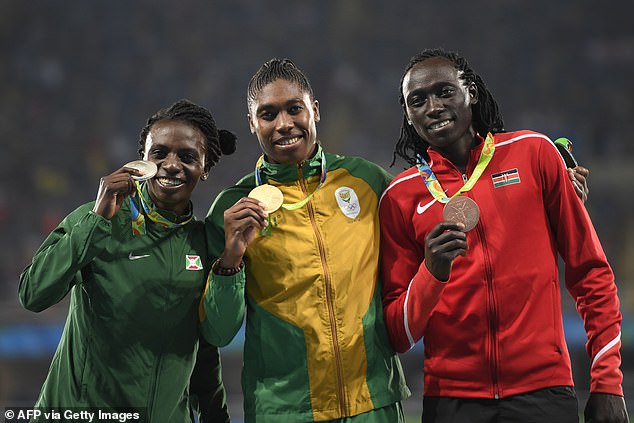The upcoming gold medal fight by gender-controversial boxer Imane Khelif has reignited a row over the women’s 800 metres at the 2016 Rio Olympics, in which all three medallists had high levels of testosterone and critics say they should be stripped of their titles.
Algerian boxer Khelif, 25, has been at the centre of the biggest storm of the Paris 2024 games after previously being disqualified from competitive boxing for failing one gender eligibility test.
The dispute has once again brought into focus the women’s 800m in Rio, won by South Africa’s Caster Semenya, who had previously been banned from competing because of her high testosterone levels.
In the years since, it has emerged that silver and bronze medallists Francine Niyonsaba of Burundi and Margaret Wambui of Kenya also had elevated testosterone levels, but neither admitted this publicly in 2016 and rules at the time allowed them to compete.
But it was an open secret, as admitted by Team GB’s Lynsey Sharp, who broke down in tears after finishing sixth despite a personal best, saying: “You can see how emotional it was. We know how everyone feels.”
Silver medallist Francine Niyonsaba of Burundi, gold medallist Caster Semenya of South Africa and bronze medallist Margaret Nyairera Wambui of Kenya on the podium after the women’s 800m at the Rio Olympics
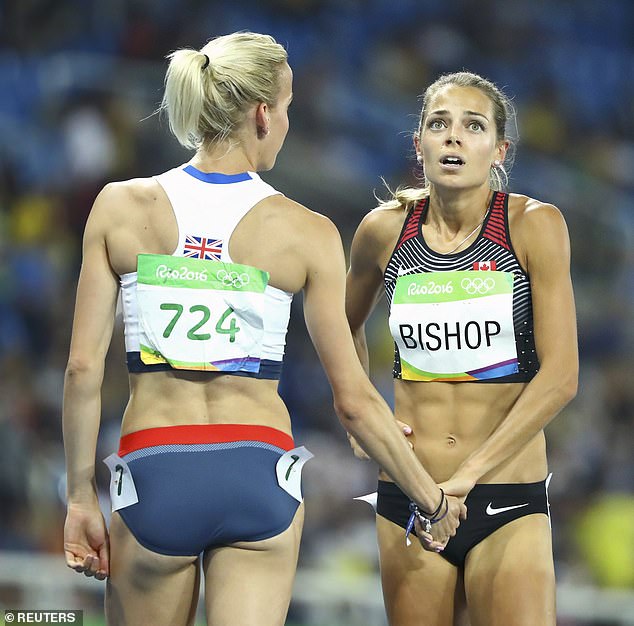
Team GB’s Lynsey Sharp was seen consoling her Canadian rival Melissa Bishop after the race.
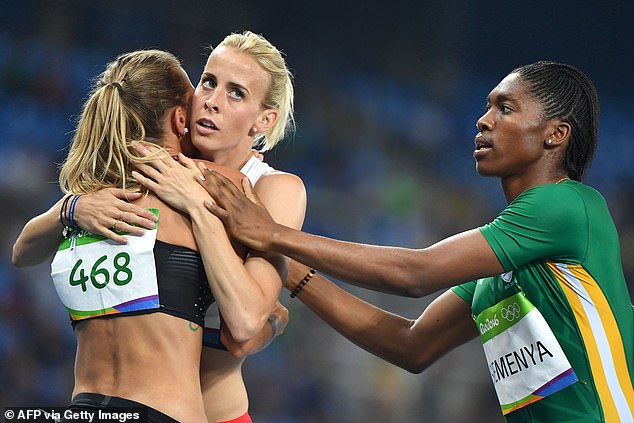
Canada’s Melissa Bishop hugged Britain’s Lynsey Sharp, while gold medallist Caster Semenya offered them both comfort.
In a show of solidarity, she was seen hugging Canadian Melissa Bishop, who finished fourth, and Joanna Jozwik of Poland, then 25, who came in fifth.
Critics now claim Bishop, Jozwik and Sharp have suffered an “injustice” and have called for all three medallists to be stripped of their titles.
“We have not forgotten the injustice that was done to Melissa Bishop, Joanna Jozwik and Lynsey Sharp,” said one on X. “Rio, 2016, when the XY men took the gold, silver and bronze medals in the women’s 800m, and the women were shamed for not thanking them for it.”
“Why haven’t these cheaters had their medals taken away?” wrote another.
Jozwik also raised questions about his opponents after the race and blamed the authorities for “doing nothing.”
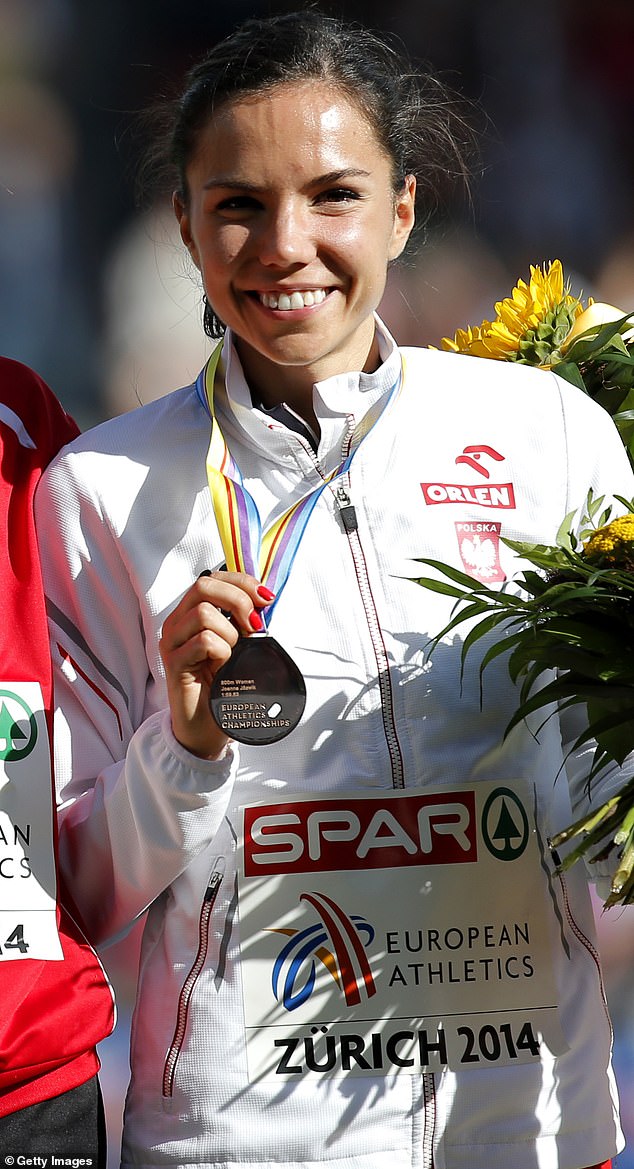
Joanna Jozwik of Poland was a bronze medallist at the European Athletics Championships two years before the Olympic Games.
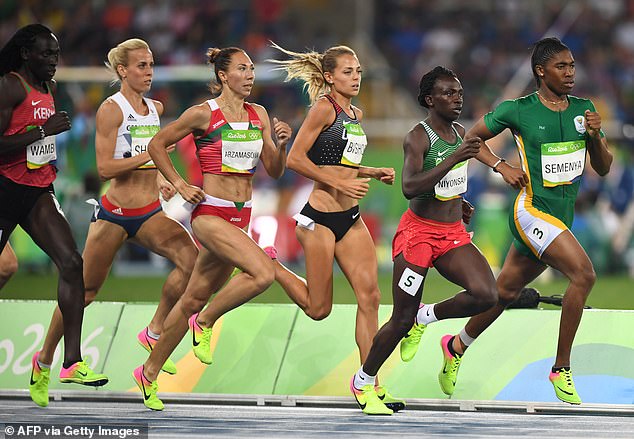
At the time, Caster Semenya (front) was allowed to compete despite her high testosterone levels.
Speaking to Eurosport, the athlete said: “The three athletes on the podium have caused a lot of controversy. I must admit that I find it a bit strange that the authorities are not doing anything about it.”
‘These guys have a very high testosterone level, similar to that of a man, which is why they look like that and run the way they do.’
‘It hurts me a little bit. I saw Melissa Bishop who was very disappointed, she improved her personal best and came fourth. It’s sad and I think she should be the gold medalist.
In an unreserved interview with the television station, Jozwik also made comments about Margaret Wambui, saying: ‘On my way to the stadium I was walking behind Wambui, who is three times bigger than me.
“How should I feel? He has a big calf, a big foot, he takes a step like three of my steps.”
She echoed the sentiments of Lynsey Sharp, who also criticised those in power for allowing the three winners to compete.
“I’ve tried to avoid the subject all year,” he said. “You can see how emotional it was. We know how everyone feels.”
“It’s something that’s out of our control and we’re very much dependent on the people at the top to sort it out. The public can see how difficult it is with the rule change, but all we can do is give it our best.”
In 2021, after her confidential medical records were leaked, Niyonsaba publicly confirmed that she is intersex and hyperandrogenic.
Although he has been banned from competing in events shorter than one mile, he has continued to participate in athletics, increasing his distance.
In 2021, she set a new 2,000m record at a Continental Tour Gold meeting in Zagreb.
Wambui has also acknowledged that she too has high levels of testosterone (due to having a 46,XY karyotype, an intersex condition) and has even called for a third category to be introduced for athletes with differences in sexual development (DSD).
DSDs have become a central point of controversy at this year’s Olympics after boxer Khelif, who had been banned from a previous international women’s competition when tests reportedly found she had “male sex chromosomes”.
At the time, International Boxing Association president Umar Kremlev claimed that tests had shown Khelif “had XY chromosomes,” which are an indicator that someone is male.





Critics have gone so far as to say that the medallists in the women’s 800m final at Rio 2016 should be stripped of their titles.
He added that “they discovered athletes trying to deceive their colleagues and pretend to be women.”
Speculation is rife that Khelif has a DSD, an umbrella term for more than 40 individual conditions that develop in the womb and affect only 0.05 to 1 percent of the population.
DSDs, also called “intersex” disorders, can result in apparently female individuals having male chromosomes or anatomy.
For example, a person may be born with female genitals but have the typical XY chromosome combination of males, as well as hidden internal testes.
They can provide people with unusual combinations of chromosomes and reproductive organs that, in the context of sport, can enhance their performance.
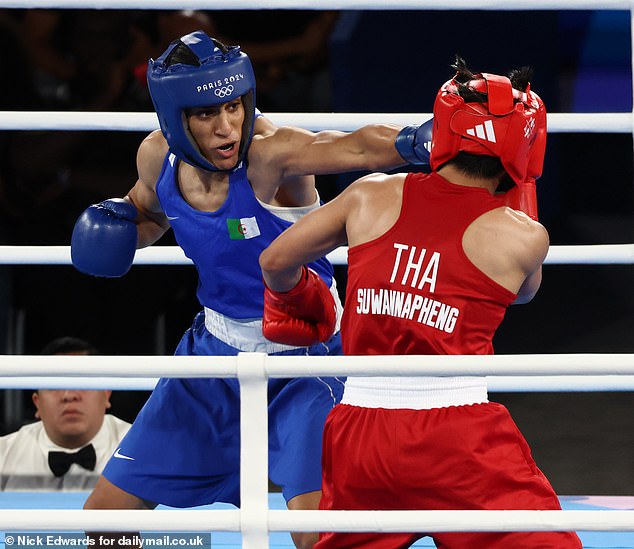
Imane Khalif punches Janjaem Suwannapheng in the face during the women’s 66kg boxing semi-final at the 2014 Paris Olympics
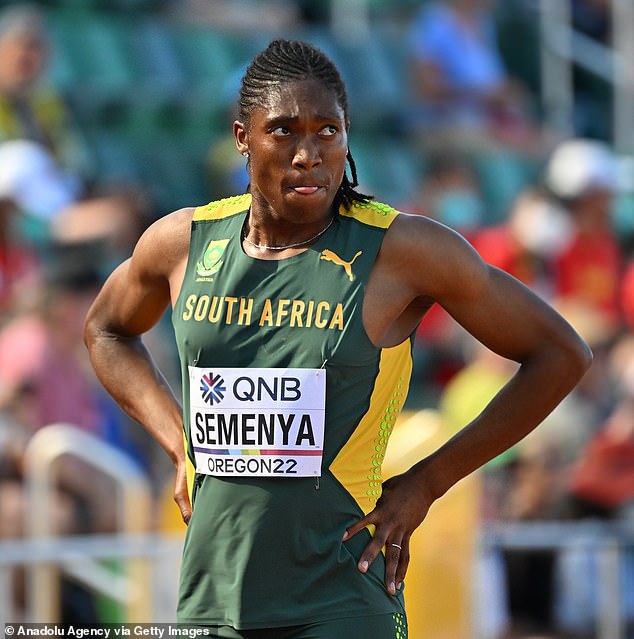
Caster Semenya, pictured at the 2022 World Athletics Championships, has never been able to defend her women’s 800m title after winning gold in Rio.
For example, an athlete may be born with female anatomy but have a DSD that increases his or her level of testosterone, a hormone essential for building muscle and strength.
While many DSDs are detected at birth, some only come to light during puberty or as a result of medical operations, tests and even autopsies.
In some cases, athletes have only found out they have a DSD during pre-competition medical testing, leading to their disqualification and ending their dreams of representing their country.
Perhaps the most famous person living with a DSD is Caster Semenya.
Semenya’s intersex condition of hyperandrogenism gives her testosterone levels three times higher than those typically found in women and closer to those of a man.
It has no uterus or ovaries and, due to a chromosomal abnormality, has internal testicles.
At 18, she rose to fame by winning the 800m world title in 2009 after it was revealed that she had undergone gender verification testing by athletics’ world governing body, the IAAF.
She was then barred from running until 2010, when it was ruled that she was a woman with extreme levels of testosterone.
From 2011 he had to take testosterone-reducing drugs for “fairness” and then won a silver medal at London 2012.
However, the decision was later challenged by Indian runner Dutee Chand, who also suffers from hyperandrogenism.
In 2015, the Court of Arbitration for Sport suspended the rules for two years, meaning Semenya could stop taking the medication.
Critics agreed that the way she has been treated has brought shame to the sport, dating back to 1966 when female competitors at the European Athletics Championships were subjected to a “naked parade” in front of three gynaecologists.
After stopping taking testosterone-lowering drugs, he won gold in the 800 metres in Rio and set a new national record.
Second place went to Burundi’s Francine Niyonsaba and Kenya’s bronze medallist Margaret Wambui.
At the time, neither Niyonsaba nor Wambui were identified as hyperandrogenic and their high testosterone levels only became apparent in later years.
Wambui has since called for a third category to be introduced for female athletes with high testosterone levels, saying that BBC Sport Africa that “it is wrong to prevent people from using their talents.”
In 2018, the IAAF introduced new Eligibility Regulations meaning that any athlete classified as having a difference of sexual development (or DSD) cannot compete in any distance between 400m and a mile in the female category, unless they artificially reduce testosterone levels.
All three were banned from competing in the 800m at the 2021 Tokyo Olympics and none have since challenged for the 800m title at an international championship.
(tags to translate)dailymail

